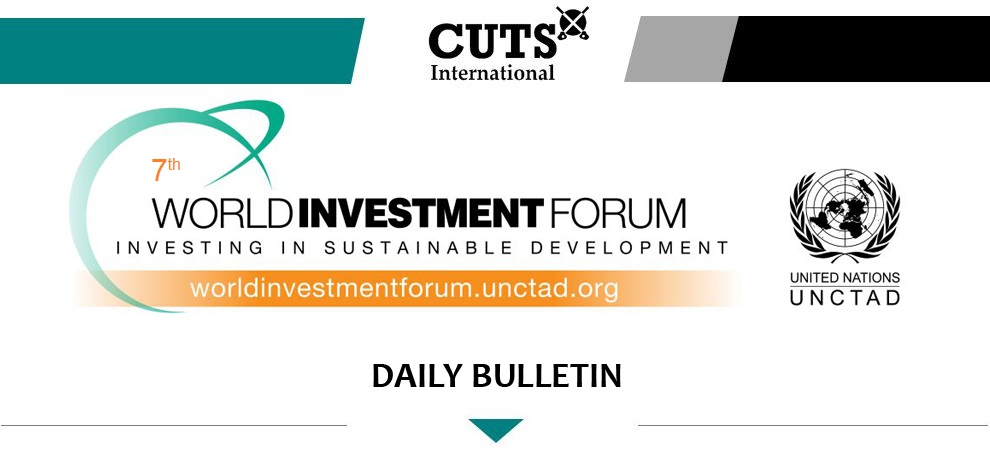October 18, 2021

Introduction
According to UNCTAD’s World Economic Report 2021, global Foreign Direct Investment (FDI) dropped by 35 per cent to US$1trillion, from US$1.5trillion in 2019. Developing countries are reported to have been the most hit, with FDI inflows reducing by up to 58 per cent. Accordingly, the session sets the stage for discussing key priority areas for research on issues related to foreign investment, role of multinational corporations and development in a global context, across multiple disciplines.
Session Highlights
During this session, the Panellists noted a major shift in investment flows during the post-recession period. This has mainly been triggered by the current preference to Regional Value Chains (RVC) over global value chains (GVC). Global data on FDI flows corroborates this assertion. Notably also, the past few years have recorded more investment in the green and blue economies. Investment in the green economy, for instance, grew tremendously in 2020. Furthermore, infrastructure investment seems to be having more traction over industrial investment.
Besides these shifts, investment and production fragmentation have been generally reducing since 2016. This is as a result of several factors:
- First, protectionist policies invoked by host governments have adversely impacted on investment decision-making processes of multinational corporations (MNCs),
- Second, taxation regimes inform MNCs on the most strategic countries to invest in as they seek lower tax jurisdictions in order to maximise profits. To this end, “tax cooperation agreements” will continue to increase,
- Third, political pressures, especially from the civil society in host countries over increasing concerns of national security and maintenance of sovereignty have had an impact on FDI flows, and
- Fourth, automation and technology have made it possible for MNCs to operate in foreign countries without necessarily having physical presence.
While concurring that MNCs are important divers of global FDI flows, the Panellists also acknowledged their role in exporting new innovations to their host countries. For example, FDI can be an ally in fighting climate change. Research shows imported innovations increase energy efficiencies by introducing environmentally friendly production processes as well fostering the uptake of clean energy.
Moving forward, the role of higher education is one of the most strategic investments that can be enhanced for the realisation of post pandemic resilience. Universities should therefore continue with their role of being research engines for the world. The COVID-19 vaccine as for instance, have benefitted immensely from studies conducted by university professors. Mobilisation of capacity to bring on board wide array skills and development of public private partnerships should be strengthened.
Several key priority areas for research on issues related to foreign investment and the role of multinational corporations were proposed by the Panellists. These included how to speed up recovery of developing countries to build long term resilience (and helping them access vaccines). The Panellists further identified the use of digital transformation, from developing countries’ perspective as a crucial thematic area needing more investigation. Study outputs would define the most appropriate technologies and actualise their domestication.
The role of FDI in regionalisation could also provide sound evidence for developing countries. For instance, not much has been studied on foreign investments with respect to the African Continental Free Trade Area (AfCFTA). Other suggested studies included scaling of financing and investment for SDGs, in-depth analyses into trade financing in order to boost investor confidence; policy reforms on international governance on investment, and how it will effect or learn from international taxation; and, the impact of special economic zones and provision of one stop services for businesses.
As the session came to a close, the speakers gave recommendations for governments, especially in developing countries for them to maximise on FDI inflows. These included adopting the rule of law while allowing flexibility through negotiations with current and potential investors, providing stable macroeconomic environments to enable firms plan and invest, as well as stabilising monetary policies. Lastly, developing countries must invest in education (mathematics and science) and girls.
Opening
- James Zhan, Director, Division on Investment and Enterprise, UNCTAD
- Farok J. Contractor, Distinguished Professor, Management and Global Business department at Rutgers Business School, and President of the Academy for International Business (AIB)
On the panel were:
- Anabel González, Deputy Director General at the World Trade Organization, senior fellow PIIE
- E. Dr. Arkebe Oqubay Metiku, Senior Minister and Special Adviser to the Prime Minister of Ethiopia
- Beata Javorcik, Chief Economist, EBRD
- Justin Yifu Lin, Professor at Peking University
- Kunal Sen, Director of UNU-WIDER and Professor of development economics at the Global Development Institute, University of Manchester
- Emily Blanchard, Professor at the Tuck School of Business at Dartmouth College
- Mariët Westermann, Vice Chancellor, New York University
- Laura Alfaro, Professor of Economics, Harvard Business School
- Gary Gereffi, Professor of Sociology and Director, Center on Globalization, Governance & Competitiveness (CGGC), Duke University
- Peter Buckley, Professor of International Business at Leeds University Business School
- Raghu Sundaram, Dean and the Edward I. Altman Professor of Credit and Debt Markets at New York University’s Leonard N. Stern School of Business
- Yaw Nyarko, Professor of Economics at New York University (NYU) and the Director of NYU Africa House, the Center for Technology and Economic Development (CTED), and Co-Director of the Development Research Institute (DRI)
Moderator
- Amelia U. Santos Paulino, Chief of Investment Issues Section, Investment and Enterprise, UNCTAD
